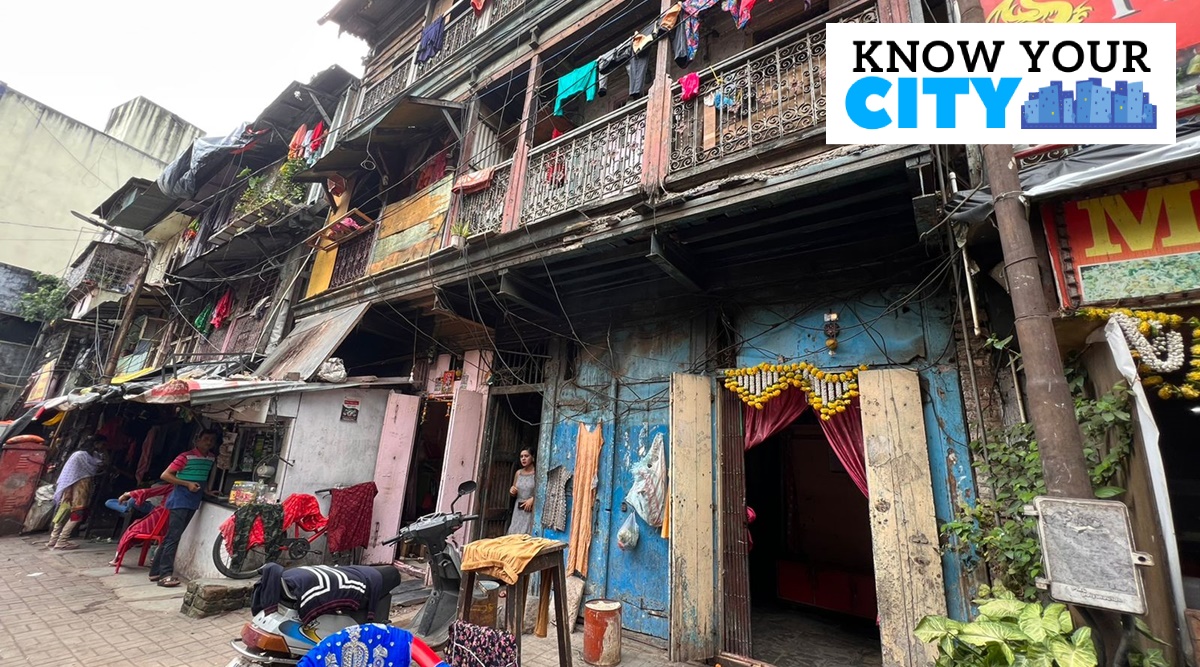 The ‘Bavankhani’, a building with 52 chambers in the Shukrawar Peth area, established during the reign of Peshwa Balaji Baji Rao, once housed courtesans. (Express Photo)
The ‘Bavankhani’, a building with 52 chambers in the Shukrawar Peth area, established during the reign of Peshwa Balaji Baji Rao, once housed courtesans. (Express Photo)A lane in the red light area of Budhwar Peth, located in the heart of Pune, is called Margi Galli, named after Margubai Kamble, a notorious sex racketeer who marked the rise of the organised flesh trade and its criminalisation in the city, post-independence.
Going by historical records, the roots of the flesh trade in Pune can be traced back to the Peshwa Era, during the first half of the 18th century. It was a time when prostitution reportedly began in the city’s Shukrawar Peth area to meet the needs of soldiers and travellers visiting the city during war missions. The ‘Bavankhani’, a building with 52 chambers in the Shukrawar Peth area, established during the reign of Peshwa Balaji Baji Rao, once housed courtesans. The same area later grew as ‘Laal Batti Kshetra’ or the red light area of Pune city, which is mainly spread across the Budhwar Peth and Shukrawar Peth regions. This area largely comes under the jurisdiction of Faraskhana police station of the Pune City police.
A study conducted a few years ago by police officials attached to the Faraskhana police station reveals how Margubai started a brothel in the red light area of Budhwar Peth and her rise to infamy.
“A study of the red light area was done on the basis of available documents, interaction with old sex workers, including those who have witnessed Margubai, details gathered from her family members, data collected with the help of social activists and other sources,” said assistant commissioner of police (retired) Bhanupratap Barge, who headed the Faraskhana police station as well as the social security cell of Pune city police in the past.
Subscriber Only Stories
The study revealed that Margubai’s father Irappa Kamble, a native of Mangsuli village in Athani taluka of Belgaum district in Karnataka, shifted to Pune in the pre-independence period, following harassment by the British. At the time, the construction of the Pune railway station was on and Irappa started working there as a labourer. While doing so, he took a room on rent at 1038 Budhwar Peth, where he resided with his family.
Irappa had four daughters, including Margubai, who was known for her aggressive nature. Margubai and her sister Rani entered the world of prostitution at ‘1045 Budhwar Peth’ for “feeding their family”, the study says. She developed her hold in the business by bringing in Devadasis from Karnataka. According to the police study, Margubai was a terror among locals and soon became wealthy. Even today, the lane where she started her sex trade business is named ‘Margi Galli’ in her name.
The study mentions that Margubai was into criminal activities, like robbing her customers, and her name also cropped up in murders, following which she was reportedly externed from Pune city limits in 1951. Police say they were told that she knew a black magician named Hussain Madari and was booked on murder charges and externed because human skulls belonging to Madari were found in her possession.
Some descendants from her family are still into the prostitution business, the study claims.
The sex trade in Pune city is no longer limited to red light areas. It has spread to the outskirts, including posh localities and five-star hotels, and now involves women from foreign countries and even those from the modeling and film industries. In Pune’s red light area, though, Margubai is still remembered.
“Margubai had a strong hold in the area. We never dared to talk to her. We never uttered anything against her out of fear. We did not even dare to come out of our rooms when she was out,” says an old brothel keeper from Karnataka. “I came here due to the Devadasi tradition. Margubai died a few years after I came here. Her sister, however, continued the business. She too died some two decades ago,” the woman added.
Another brothel keeper, in her seventies now, said, “Margubai used to bring girls from Karnataka. They joined this trade mainly due to the Devadasi tradition. They dominated the business till the early 1970s. Then, women from Nepal, Andhra Pradesh, West Bengal, Bihar, Assam and north-eastern states also started coming here.”
The police study mentions how there was an attempt to shift the red light area located around the business belt in the middle of the city to the outskirts of Yerwada, Gultekdi and Market Yard. The women who owned the brothels then had held a meeting with the then Prime Minister Indira Gandhi with the help of a Congress party leader S K Kusalkar (Sheth). They submitted a memorandum to Gandhi that the red light area should not be shifted. Gandhi passed an oral order in favour of the women, following which the plan was scrapped. The study includes photographs of the meeting.
The police study says, after 1980, particularly after the Devadasi system was banned, women from Nepal started entering the trade. Shantabai Nepali, police said, is considered to be the first Nepali brothel keeper in Pune.
An estimated number of over 4,000 commercial sex workers live in Pune’s red light area in around 360 brothel houses in 76 buildings. Police say a large numbers of Bangladeshi girls are being forced into prostitution, cheated by agents on false promises of marriage and jobs and sold to brothel keepers. There is no estimate of sex workers in Pune suburbs.
- The Indian Express website has been rated GREEN for its credibility and trustworthiness by Newsguard, a global service that rates news sources for their journalistic standards.

